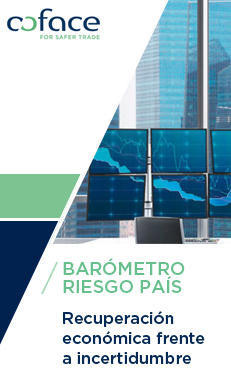

Suriname
Synthesis
major macro economic indicators
| 2020 | 2021 | 2022 | 2023 (e) | 2024 (f) | |
|---|---|---|---|---|---|
| GDP growth (%) | -15.9 | -2.7 | 1.3 | 2.3 | 3.0 |
| Inflation (yearly average, %) | 34.9 | 59.1 | 52.5 | 42.7 | 27.3 |
| Budget balance (% GDP) | -11.2 | -7.3 | -3.5 | 0.2 | 0.2 |
| Current account balance (% GDP) | 9.0 | 5.9 | -1.7 | 0.0 | -1.0 |
| Public debt (% GDP) | 143.8 | 117.0 | 123.2 | 112.2 | 103.2 |
(e): Estimate (f): Forecast
STRENGTHS
- Mineral resources (gold, oil, gas, bauxite) and agricultural (rice, bananas), forestry (wood) and hydroelectric potential
- Ecuadorian forest covering 95% of the country
- Support from international lenders and foreign investors
- Financial aid from the Netherlands, the former colonial power, and expatriate remittances
- Active member of the Caribbean Community (CARICOM)
WEAKNESSES
- Undiversified economy: dependent on gold, oil and aluminium
- Size of the informal economy (30% of GDP) with casinos, gold panning, smuggling and drug trafficking
- Difficulties in managing public companies
- Inadequate transport infrastructure (roads, ports, air)
- Challenging business climate, inefficient justice system
- Vulnerable banking sector: high proportion of bad loans and low profitability
- Difficult access to credit
- Lack of skilled labour
Risk Assessment
Recovery gains slight traction
The deep recession triggered by the Covid-19 pandemic has given way to a moderate recovery, which will gain some traction in 2024. With gold historically accounting for 80% of exports, durably high gold prices will support exports. But despite moderating food prices, the expected rise in energy prices, coupled with growing demand for capital goods and services associated with oil exploration, will continue to weigh on imports, which will be boosted by a weak currency. However, oil exploration will generate substantial investment, which will support growth. The discovery of new hydrocarbon deposits off the coast, in Block 58, by the joint venture between Total and APA (most recently in February 2023) and the hope of further discoveries should stimulate private investment in 2024, particularly foreign investment. The final investment decision on Block 58, initially planned for 2022, was delayed, but is now expected in 2024. Grounds for the decision were notably improved by the latest discovery which holds great promise in terms of marketable volume. Inflation, which has been very high since the adoption of a floating exchange rate in 2020 and the subsequent devaluation of the Surinamese dollar, will continue to ease in 2024. The trend will be mainly due to more restrictive monetary policies (open market operations to contain liquidity in local currency, etc.) and fiscal policies on back of the fiscal consolidation programme (VAT, abolition of fuel subsidies, etc.). This programme is part of the Extended Credit Facility (ECF) granted by the IMF from 2021. Inflation will nevertheless remain sufficiently high to weigh heavily on household purchasing power, limit private consumption and ultimately weaken the economic rebound.
Debt restructuring and tax consolidation in progress
While the devaluation of the Surinamese dollar and the downturn in the economy led to a debt default at the end of 2020, the ensuing negotiations resulted in a rescheduling agreement with the Paris Club in June 2022, which has suspended repayments until 2028 and encourages all creditors to grant comparable terms. Since then, bilateral agreements have been reached with all Paris Club creditors (with the exception of Italy, whose signature is pending) and with India. Negotiations with China, which holds 11.5% of the country's public debt, are under way and should be concluded in the coming months. An agreement in principle has also been reached with bondholders, proposing a nominal discount of 25% and an interest rate of 4.95% until January 2026. Hence, despite persistently high debt levels, the arrears have been partly repaid (60% of the arrears due to the Paris Club have been repaid), and the restructuring under way should make the public debt more sustainable in 2024.
In addition to negotiations to reschedule its public debt, the IMF has granted the country USD 690 million over 3 years under an Extended Credit Facility (ECF) in return for a programme of measures to consolidate public finances and structural reforms, which are currently being implemented. These measures could result in a small government surplus by 2024. A value-added tax was introduced at the beginning of 2023 and its revenues are set to increase in 2024 as a result of a number of reforms, such as the reduction in exemptions to bring the coverage of standard VAT (10%) to at least 60% of household consumption, or the acceleration of the registration of businesses subject to VAT. Revenues will also benefit from the already initiated reduction (until their total abolition) of energy subsidies, the cost of which is estimated at USD 51 million over one year, or 1.4% of GDP. However, given the difficulties still faced by the most disadvantaged households, social spending will remain high, which will hamper fiscal consolidation.
The balance of trade will be in deficit, reflecting the rise in imports, which robust gold exports will not be able to offset. However, remittances from the country’s large diaspora (between 4% and 5% of GDP), who reside mainly in the Netherlands, will limit the current account deficit.
The four-party coalition faces major social tensions
The Vooruitstrevende Hervormings Partij (VHP), which historically represents the Indo-Surinamese population but has managed to eliminate its ethnic dimension, became the country's main party in the May 2020 legislative elections. The VHP leads a coalition of four parties that gave the government an absolute majority. The President, Chan Santokhi, is involved in driving structural reforms, which are as necessary for the country's financial health but which are unpopular. Faced with the rising cost of living posed by persistently high inflation and the tax reforms introduced at the start of 2023, violent demonstrations and subsequent riots broke out across the country in February and March. Against this backdrop, the risk of a snap election – the election timetable is normally scheduled for 2025 – although low, cannot be ruled out. In addition, the country continues to be plagued by a high level of corruption and crime (drug trafficking, illegal mining, etc.).
Last updated: October 2023






